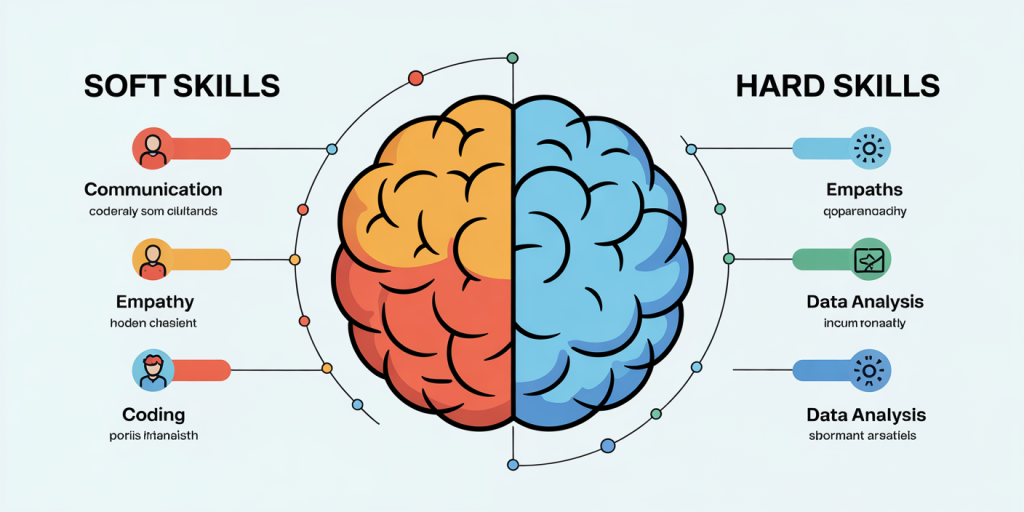Soft Skills vs. Hard Skills: Which Are More Important?
In today’s rapidly evolving job market, the debate over the importance of soft skills versus hard skills continues to intensify. Employers and employees alike often find themselves asking which set of abilities truly drives success in the workplace. While hard skills refer to technical proficiencies and specific knowledge, soft skills capture interpersonal and emotional competencies that influence collaboration, creativity, and leadership. Both categories undeniably contribute to professional effectiveness, but understanding their unique roles and measuring their impact has become essential for career growth and organizational development.

Employers increasingly emphasize a balanced skill set to meet the dynamic demands of modern jobs. According to a 2023 report by LinkedIn, 92% of talent professionals claim that soft skills are equally or more important than hard skills when hiring candidates. This shift reflects evolving workplace environments that rely not only on technical expertise but also on adaptability, communication, and problem-solving abilities. The following sections explore these two skill types in depth, assess their value across various industries, and analyze which skill sets might hold the key to future workforce success.
Defining Soft Skills and Hard Skills
Soft skills typically encompass interpersonal traits, emotional intelligence, and behavioral characteristics that enable individuals to interact effectively with others. Common examples include communication, teamwork, empathy, time management, and leadership. Soft skills are often less tangible and harder to quantify but are critical for fostering productive relationships and navigating workplace challenges. For instance, a project manager may possess robust technical knowledge yet struggle to motivate their team without strong interpersonal skills.
Conversely, hard skills are explicit technical capabilities and domain-specific knowledge that can be taught, measured, and tested. These include software proficiency, coding languages, financial analysis, machinery operation, and other quantifiable competencies. A certified public accountant’s ability to prepare accurate financial statements or an IT specialist’s expertise in cybersecurity are typical examples. Hard skills are often the minimum requirement to secure employment and complete job-specific tasks efficiently.
Anúncios
Practice illustrates their interplay: a software developer skilled in coding languages but unable to communicate project requirements to teammates may create bottlenecks in collaborative environments. Meanwhile, employees with excellent soft skills but insufficient technical skills may struggle with complex task completion. Thus, employers increasingly value candidates who combine both skill types effectively.
The Role of Soft Skills in Career Advancement
Soft skills have grown paramount in career advancement as organizations emphasize leadership, innovation, and customer engagement. A Carnegie Mellon University survey found that 85% of job success comes from well-developed soft skills, while only 15% depends on hard skills. This statistic highlights how emotional intelligence, problem-solving, and adaptability often differentiate top performers from their peers.
For practical insight, consider the case of Satya Nadella, CEO of Microsoft, who credits much of his leadership success to empathy and effective communication rather than technical expertise alone. Nadella transformed Microsoft’s corporate culture by championing collaboration and emotional intelligence, which in turn fostered innovation and employee satisfaction. Such examples demonstrate how soft skills can pivot careers from competent operation to influential leadership.
Moreover, soft skills play a crucial role in customer-facing industries. Sales representatives and client service professionals rely heavily on their ability to listen actively, negotiate tactfully, and handle conflict sensitively. According to the National Association of Colleges and Employers (NACE), 75% of employers prioritize communication skills during the hiring process because these abilities directly influence customer interactions and retention.
Hard Skills as the Foundation of Job Competence
Despite the rise in demand for soft skills, hard skills remain indispensable as the foundation of job competence. Certain roles and industries demand specialized knowledge that cannot be substituted by interpersonal abilities. For example, an aerospace engineer designing flight systems must have precise technical skills rooted in mathematics, physics, and computer-aided design (CAD). No amount of soft skills can replace the necessity for exact technical knowledge in such fields.
Data from the U.S. Bureau of Labor Statistics indicates that occupations requiring advanced hard skills, such as programming or data analysis, tend to offer higher median salaries and job security. The 2022 Stack Overflow Developer Survey revealed that 76% of employers consider proficiency in specific programming languages as a key hiring criterion in technology roles. Without hard skills, candidates may not meet even the minimum qualifications for technical roles, regardless of their soft skill strengths.
Anúncios

Additionally, continuous technological advancements underscore the importance of hard skills. In industries like healthcare, manufacturing, and finance, professionals are expected to stay up to date with new software, regulatory knowledge, and process improvements. For example, registered nurses must master electronic health record systems to deliver timely and accurate care documentation. Consequently, hard skills serve as the operational backbone enabling professionals to execute their duties effectively.
Comparative Analysis: Soft Skills vs. Hard Skills
To better understand the relative importance of soft skills versus hard skills, the following table summarizes their characteristics, applications, and impact on professional success:
| Attribute | Soft Skills | Hard Skills |
|---|---|---|
| Definition | Interpersonal and emotional abilities | Technical knowledge and task-specific abilities |
| Measurability | Difficult to quantify | Easily testable and measurable |
| Examples | Communication, teamwork, leadership | Coding, accounting, data analysis |
| Role in hiring | Critical for cultural fit and collaboration | Minimum requirement for job eligibility |
| Impact on career growth | Essential for leadership and innovation | Fundamental for job performance |
| Industry dependence | Important across all industries | Highly relevant in technical fields |
| Adaptability | Highly transferable across roles | May require frequent updates |
| Long-term value | Sustains workplace relationships | Enables core job functions |
This comparison highlights that neither skill group is universally more important; instead, their relevance depends on job context and career stage. Entry-level roles may prioritize hard skills for task execution, while leadership positions increasingly demand advanced soft skills. Moreover, hybrid roles—such as product managers—require a strategic blend of both.
Real-World Case Studies
Examining real-world cases illustrates how combined skill sets influence career outcomes:
1. Amazon’s Leadership Model: Amazon places high emphasis on both technical proficiency and soft skills such as “Customer Obsession” and “Bias for Action.” Employees who demonstrate problem-solving alongside effective communication excel in Amazon’s results-driven culture.
2. Tesla’s Engineering Teams: Tesla engineers need cutting-edge hard skills to innovate electric vehicles, but collaboration across departments is equally essential to refine designs rapidly, showcasing the interplay between skills.
3. Zappos Customer Service: Zappos, renowned for its customer service, prioritizes soft skills like empathy and problem-solving, emphasizing that hard skills alone cannot produce positive customer experiences.
These examples reinforce that organizations achieve optimal performance when hard and soft skills complement each other.
Future Perspectives on Skill Development
Looking forward, the importance of both soft and hard skills will intensify with shifting workplace trends. The rapid advance of artificial intelligence and automation is anticipated to automate many routine hard-skill tasks, increasing the value of uniquely human soft skills such as creativity, resilience, and ethical judgment. A World Economic Forum report in 2024 projects that skills like critical thinking, emotional intelligence, and complex problem-solving will grow by over 40% in importance by 2030.

However, the continuous emergence of new technologies demands lifelong learning and adaptability in hard skills as well. Professionals will need to upskill periodically to remain competitive, blending technical mastery with emotional and social intelligence.
Educational institutions and corporate training programs are evolving accordingly, increasingly incorporating both skill areas into curricula. Organizations are adopting blended learning models that combine technical training with leadership workshops and communication courses.
Ultimately, employees and employers that foster balanced skill development stand to thrive in an unpredictable future workplace where collaboration across diverse teams is paramount. Cultivating this dual competence will likely define successful careers and innovative companies.
